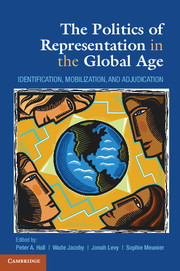Book contents
- Frontmatter
- Dedication
- Contents
- Abbreviations
- Acknowledgments
- Foreword
- 1 Introduction
- Part I The Politics of Interest Representation
- Part II Responding to the Challenges of a Global Era
- 4 Globalization and the Politics of Trade Union Preferences in France
- 5 Public-Private Institutions as Social and Knowledge Bridges
- 6 Reorganizing Representation in Latin America in the Neo-Liberal Age
- Part III New Institutional Settings for Representation
- Short Biographies of Editors and Contributors
- Index
- References
4 - Globalization and the Politics of Trade Union Preferences in France
Published online by Cambridge University Press: 05 June 2014
- Frontmatter
- Dedication
- Contents
- Abbreviations
- Acknowledgments
- Foreword
- 1 Introduction
- Part I The Politics of Interest Representation
- Part II Responding to the Challenges of a Global Era
- 4 Globalization and the Politics of Trade Union Preferences in France
- 5 Public-Private Institutions as Social and Knowledge Bridges
- 6 Reorganizing Representation in Latin America in the Neo-Liberal Age
- Part III New Institutional Settings for Representation
- Short Biographies of Editors and Contributors
- Index
- References
Summary
When trying to account for trade union preferences over globalization, dominant accounts in political economy point to the factor endowment of actors and contend that their preferences will be determined by the way these factors are affected by the opening of borders. These accounts generally predict that, in developed countries, low-skill workers located in trade-exposed sectors will tend to oppose globalization and, therefore, unions representing these workers will favor an antiglobalization stance. Although they build on different premises, neo-Marxist and Polanyian accounts also assume that trade union preferences over globalization reflect the effects of globalization, even if these effects are filtered by national institutional configurations. Put simply, in developed countries trade unions are likely to oppose globalization because the latter inevitably runs counter to the interests of the working class and the preservation of redistributive collective arrangements.
In spite of their differences, these accounts share a common assumption: The key to understanding trade union preferences over globalization lies in situating workers with respect to the international economy and assessing the material effects of globalization on these workers. Such empirical investigation and assessment is indispensible, but it is not necessarily the best way to make sense of trade union preferences. This chapter argues that understanding trade union preferences over globalization requires that we approach unions as complex organizations rather than merely aggregates of individual workers. It follows that we need to track down how specific events affect unions rather than workers and trace how these events are interpreted, pulled in, and used by actors seeking to strengthen their position inside their union as well as ensure the maintenance of their union. Furthermore, this chapter claims that the preferences of organizations are neither given nor generated instantaneously; they are the result of a multilayered political-cultural process that unfolds over time. In order to substantiate this claim, this chapter compares the preference formation process of the two largest labor confederations in France, the French Democratic Labor Confederation (CFDT) and the General Labor Confederation (CGT), since the late 1970s. It argues that their current preferences over globalization are the product of a deeper reorientation that took place in the 1980s as the CFDT and the CGT experienced a major organizational crisis that generated a critical juncture and faced the failure of President Mitterrand's “Keynesianism in one country.”
- Type
- Chapter
- Information
- The Politics of Representation in the Global AgeIdentification, Mobilization, and Adjudication, pp. 75 - 99Publisher: Cambridge University PressPrint publication year: 2014

